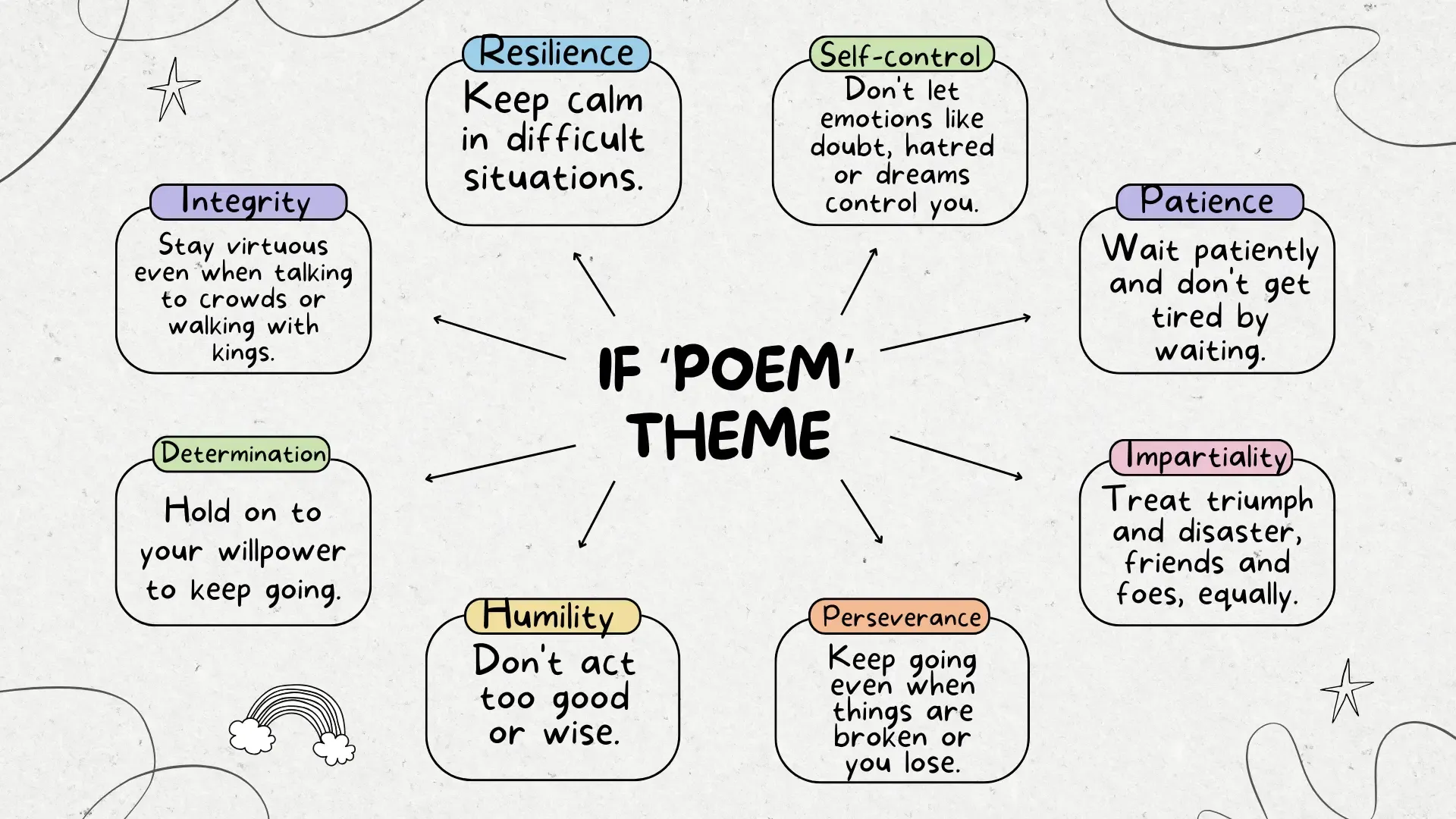Read the following poem ‘If’ by Rudyard Kipling and try to understand the meaning it conveys. This inspirational poem is based on the theme patience and perseverance. This original poem is followed by important questions and their answers that are helpful for the students of all levels.
{getToc} $title={Table of Contents}If by Rudyard Kipling [Original Poem]
Stanza 1
If you can keep your head when all about you Are losing theirs and blaming it on you, If you can trust yourself when all men doubt you, But make allowance for their doubting too; If you can wait and not be tired by waiting, Or being lied about, don’t deal in lies, Or being hated, don’t give way to hating, And yet don’t look too good, nor talk too wise: |
Stanza 2
If you can dream—and not make dreams your master; If you can think—and not make thoughts your aim; If you can meet with Triumph and Disaster And treat those two impostors just the same; If you can bear to hear the truth you’ve spoken Twisted by knaves to make a trap for fools, Or watch the things you gave your life to, broken, And stoop and build ’em up with worn-out tools: |
Stanza 3
If you can dream—and not make dreams your master; If you can think—and not make thoughts your aim; If you can meet with Triumph and Disaster And treat those two impostors just the same; If you can bear to hear the truth you’ve spoken Twisted by knaves to make a trap for fools, Or watch the things you gave your life to, broken, And stoop and build ’em up with worn-out tools: |
Stanza 4
If you can make one heap of all your winnings And risk it on one turn of pitch-and-toss, And lose, and start again at your beginnings And never breathe a word about your loss; If you can force your heart and nerve and sinew To serve your turn long after they are gone, And so hold on when there is nothing in you Except the Will which says to them: ‘Hold on!’ |
Stanza 5
If you can talk with crowds and keep your virtue, Or walk with Kings—nor lose the common touch, If neither foes nor loving friends can hurt you, If all men count with you, but none too much; If you can fill the unforgiving minute With sixty seconds’ worth of distance run, Yours is the Earth and everything that’s in it, And—which is more—you’ll be a Man, my son! |
Analysis of the Poem If by Rudyard Kipling
Stanza 1 Analysis
If you can keep your head when all about you Are losing theirs and blaming it on you, | • Keep calm when others panic and people blame you. |
If you can trust yourself when all men doubt you, But make allowance for their doubting too; | • Trust yourself even when others doubt you, but understand why they doubt. |
If you can wait and not be tired by waiting, Or being lied about, don’t deal in lies, | • Wait patiently, don't lie even if others lie about you. |
Or being hated, don’t give way to hating, And yet don’t look too good, nor talk too wise: | • Don't hate those who hate you. Don't act too good or wise. |
Stanza 2 Analysis
If you can dream—and not make dreams your master; | • Don't let your dreams control you. |
If you can think—and not make thoughts your aim; | • Think, but don't make thinking your only goal. |
If you can meet with Triumph and Disaster And treat those two impostors just the same; | • Treat success and failure the same way. |
If you can bear to hear the truth you’ve spoken Twisted by knaves to make a trap for fools, | • If people twist the truth you said to trap others, keep going. |
Or watch the things you gave your life to, broken, And stoop and build ’em up with worn-out tools: | • If things you worked hard for get broken, rebuild them with old tools. |
Stanza 3 Analysis
If you can make one heap of all your winnings And risk it on one turn of pitch-and-toss, | • If you can risk all your winnings on one toss of a coin, and lose it all, |
And lose, and start again at your beginnings And never breathe a word about your loss; | • And start over again without complaining about losing, |
If you can force your heart and nerve and sinew To serve your turn long after they are gone, | • Force yourself to keep going even after you are tired, |
And so hold on when there is nothing in you Except the Will which says to them: ‘Hold on!’ | • Hold on to your willpower that tells you to keep going. |
Stanza 4 Analysis
If you can talk with crowds and keep your virtue, | • If you can talk to crowds and stay virtuous, |
Or walk with Kings—nor lose the common touch, | • Walk with kings but not lose common touch, |
If neither foes nor loving friends can hurt you, | • If neither enemies nor friends can hurt you emotionally, |
If all men count with you, but none too much; | • Value all people equally, but no one too much, |
If you can fill the unforgiving minute With sixty seconds’ worth of distance run, | • Make use of every unforgiving minute, |
Yours is the Earth and everything that’s in it, And—which is more—you’ll be a Man, my son! | • Then the whole earth is yours, and you'll be a good man. |
Themes in the poem ‘If’ by Rudyard Kipling
Vocabulary Exercise
a. unforgiving | i. a dishonest person |
b. virtue | ii. badly damaged and no longer useful |
c. sinew | iii. behaviour showing high moral standards |
d. pitch-and-toss | iv. a great success, achievement or victory |
e. worn-out | v. a game of skill and chance |
f. stoop | vi. a strong band of tissues in the body |
g. knave | vii. not giving a second chance; not happening again |
h. triumph | viii. a person who cheats by pretending to be somebody else |
i. impostor | ix. to bend the body forwards and downwards |
Vocabulary Answers
Words/Phrases | Meanings |
a. unforgiving | vii. not giving a second chance; not happening again |
b. virtue | iii. behavior showing high moral standards |
c. sinew | vi. a strong band of tissues in the body |
d. pitch-and-toss | v. a game of skill and chance |
e. worn-out | ii. badly damaged and no longer useful |
f. stoop | ix. to bend the body forwards and downwards |
g. knave | viii. a person who cheats by pretending to be somebody else |
h. triumph | iv. a great success, achievement or victory |
i. impostor | i. a dishonest person |
Important questions and answers
a. What does the poet suggest about dealing with lies? |
The poet suggests that we should not give up when faced with lies. We should keep trying and not let lies stop us. |
b. What do you mean by 'not be tired by waiting'? |
The poet means that we should not get tired or give up while waiting for our dreams to come true. We should be patient. |
c. Why should we not aim only to dream in life? |
We should not just dream but also take action to make our dreams a reality. Dreaming alone is not enough. |
d. How do you think we can achieve our dream? |
To achieve our dreams, we need to work hard, be patient, and never give up despite challenges. |
e. What can knaves do to us? |
Dishonest people or knaves can cheat us or take advantage of us if we are not careful. |
f. Why should we forget our failures in life? |
We should forget our failures so that they do not discourage us or hold us back from trying again. |
g. What should we do if we lose the 'pitch-and-toss'? |
If we lose at something, we should not get tired or give up. We should keep trying until we succeed. |

